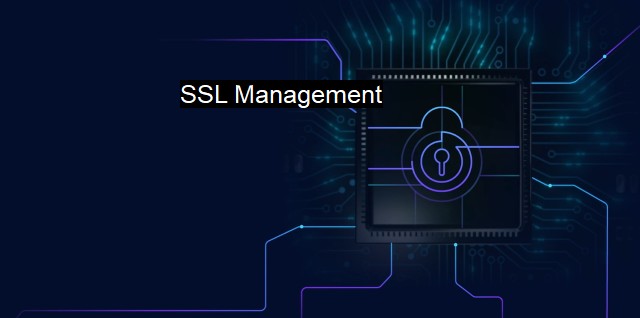What is SSL Management?
Securing Your Web Connections: The Importance of SSL Management for Cybersecurity and Antivirus Protection
SSL Management is a vital consideration within the domain of cybersecurity. Its significance lies in the necessity for businesses to secure their connections, transactions, and interactions on the worldwide web. To understand SSL management, it's important to first comprehend what SSL, or Secure Sockets Layer, is. It is a technology that secures a connection between a web browser (the client) and a web server, ensuring that any interaction between the two is encrypted and thus safeguarded against any potential eavesdropping or tampering.SSL functions through a process known as Public Key Infrastructure (PKI). In this system, an SSL certificate issued by a trusted Certificate Authority (CA) is installed on a web server. This certificate consists of a pair of keys - a public key used to encrypt data and a private key used to decrypt it. When a client connects to a server that has an SSL certificate, the server shares its public key with the client. The client then uses this public key to encrypt and send a symmetric session key back to the server. These encryption and decryption activities happen behind the scenes and are unseen by the users.
When a business has multiple domains, subdomains, or servers, managing multiple SSL certificates can become complex. This is where SSL management comes into play. It is a critical component of network administration that involves overseeing and maintaining all SSL certificates within the network to ensure they remain functional and up-to-date.
SSL management includes the provision of obtaining SSL certificates from recognized Certificate Authorities, installing them correctly on the server, and constantly monitoring them to ensure they are functioning optimally. Regular renewal of these certificates is also an important aspect of this process. An expired SSL certificate can lead to a disrupted service and can also detrimentally affect the site's SEO rankings.
Large organizations or those that have many websites must be particularly attentive to SSL management to ensure a secure virtual presence. Having numerous certificates without proper management can create untold vulnerabilities for hostile entities to exploit.
In the realm of antivirus and cybersecurity, SSL management plays a profound role in mitigating risks and ensuring security. When an SSL certificate is installed, data in transit is encrypted, safeguarding it from interception by scammers, hackers, and malware.
Regular SSL management also enforces trust in your website or online services. A valid SSL certificate displayed on a website in the form of a padlock or a green bar in the browser’s URL field, speaks volumes about the website's trustworthiness and the level of security provided to its users.
Regardless of the size of the enterprise or the depth of its digital footprint, SSL management is wonderfully effective in keeping the company's cyber-security imperatives in check. One missed certificate renewal, an overlooked subdomain or a compromised server can lead to data leaks, breaches, legal implications, not to mention the erosion of trust in clients and customers. Therefore it's utterly critical that proactive steps are taken to ensure things are managed, updated and accounted for.
SSL management is a prime necessity, streamlining security operations and exerting an influence which goes beyond just technical considerations. It seeps into the trust factor, impacts the brand reputation, and stands influential in creating robust relationships with customers or clients, putting SSL management at the forefront of cybersecurity paradigms across the globe. It is not just a strategy but a critical line of defense in the quest towards providing a safe and secure digital space to the users.

SSL Management FAQs
What is SSL management?
SSL management refers to the process of managing SSL (Secure Sockets Layer) certificates, which are used to secure online communication and transactions between servers and clients. SSL management involves the issuance, installation, renewal, and revocation of SSL certificates.Why is SSL management important for cybersecurity?
SSL management is important for cybersecurity because SSL certificates encrypt sensitive data transmitted over the internet, such as usernames, passwords, and credit card numbers, preventing hackers and cybercriminals from intercepting and stealing this information. Proper SSL management ensures that SSL certificates are up-to-date, valid, and trustworthy, reducing the risk of data breaches and cyber attacks.What are the benefits of using SSL management tools?
SSL management tools offer several benefits to organizations, including automated SSL certificate discovery and tracking, centralized SSL certificate management, real-time SSL certificate monitoring and alerts, and SSL certificate lifecycle management. These tools help organizations to maintain strong SSL encryption and ensure compliance with industry regulations and standards.How can antivirus software be integrated with SSL management?
Antivirus software can be integrated with SSL management to provide additional protection against cyber threats. Some antivirus software includes SSL scanning and inspection capabilities, which detect and block malicious SSL traffic, such as SSL phishing and malware. By combining SSL management with antivirus software, organizations can enhance their cybersecurity defenses and mitigate the risks associated with SSL vulnerabilities.| | A | | | B | | | C | | | D | | | E | | | F | | | G | | | H | | | I | | | J | | | K | | | L | | | M | |
| | N | | | O | | | P | | | Q | | | R | | | S | | | T | | | U | | | V | | | W | | | X | | | Y | | | Z | |
| | 1 | | | 2 | | | 3 | | | 4 | | | 7 | | | 8 | | |||||||